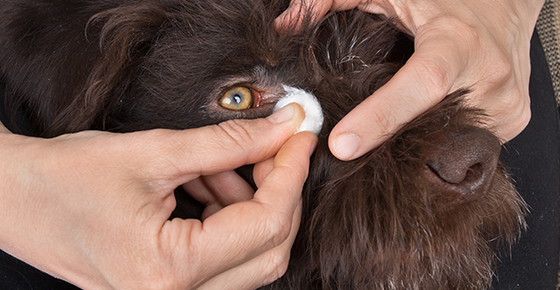
Many dogs have thick eye discharge. Sometimes it is just in the morning; sometimes it has to do with a dog’s breed. Some breeds of dogs have eyes that sit differently in their skull, causing more discharge. And, sometimes, the goopy eye is a sign of a severe, chronic and painful condition called keratoconjunctivitis sicca (KCS). KCS is commonly called chronic dry eye.
KCS, or Chronic Dry Eye, Symptoms
Often, the only thing owners notice is thick white or yellow discharge from one or both eyes. In other dogs, the white part of the eye, the sclera, can also be red, and the dog may rub at their eyes. In haired breeds, the hair around the eye often becomes matted with discharge from the eyes.
The Schirmer Tear Test
This condition can be easily confused with other eye conditions, such as allergies, unless the appropriate diagnostic tests are done. KCS is easily diagnosed with a test called the Schirmer Tear Test. This test takes 1 minute per eye and uses a little piece of paper to measure how much tear the eye produces. If the eye doesn’t produce enough tears, the answer is clear!
Effects of Untreated KCS
If it goes untreated, KCS can cause permanent corneal scarring, corneal ulcers, darkening of the cornea, and chronic pain. Many dogs will lose their vision due to these severe changes, and some dogs will even become aggressive or sensitive about their heads/ faces being touched because of the pain.
Adult onset KCS (acquired KCS) is often due to an inappropriate immune response. Treatment is a lifelong regime of eye drops that allow the eye to produce tears again. Supplemental moisturizing eye drops can also be used.
With appropriate treatment, the condition is manageable, and the health of the eye can be saved. And, most important, the pet that is suffering from this disease will be comfortable, pain free, and happy.
